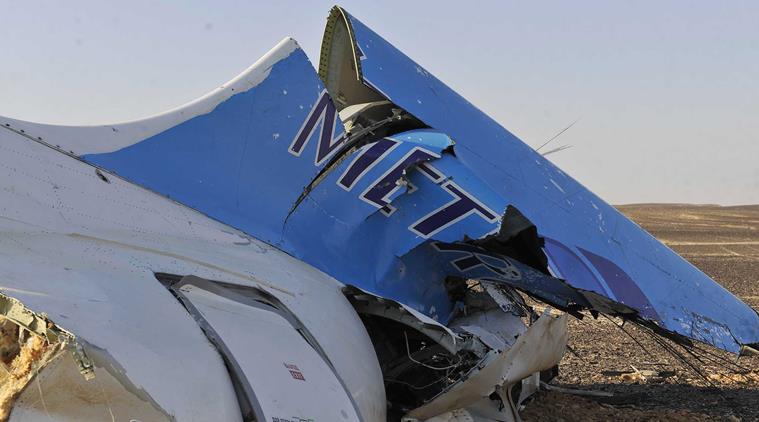Latest NEWS
- Aswat Masriya, the last word
- Roundup of Egypt's press headlines on March 15, 2017
- Roundup of Egypt's press headlines on March 14, 2017
- Former Egyptian President Hosni Mubarak to be released: lawyer
- Roundup of Egypt's press headlines on March 13, 2017
- Egypt's capital set to grow by half a million in 2017
- Egypt's wheat reserves to double with start of harvest -supply min
- Roundup of Egypt's press headlines on March 12, 2017
REUTERS - Russian airline sees no technical fault, pilot error in Egypt crash

The remains of a Russian airliner which crashed is seen in central Sinai near El Arish city, north Egypt, October 31, 2015. REUTERS/Stringer
MOSCOW (Reuters) - The Russian airline whose jet crashed in Egypt, killing all on board, said on Monday the disaster could not have been caused by a technical fault or human error.
The crash, in Egypt's Sinai Peninsula on Saturday, could only have been the result of some other "technical or physical action" which caused it to break up in the air and plummet to the ground, said Alexander Smirnov, deputy general director of the airline, Kogalymavia.
He did not specify what that action might have been, saying it was up to the official investigation to determine.
"The plane was in excellent condition," Smirnov told a news conference in Moscow. "We rule out a technical fault and any mistake by the crew," he said.
He said there had been no emergency call from the pilots to services on the ground during the flight, which took off from the Egyptian Red Sea resort of Sharm el-Sheikh bound for the Russian city of St Petersburg.
Several aviation experts questioned whether the airline had enough information so early in the investigation, without the benefit of a complete readout from "black box" flight recorders, to say what may or may not have caused the crash.
Under international aviation rules, airlines are not directly accredited to crash investigations and are discouraged from commenting on probes while they are still active.
"What is really disturbing is the statement by the company that this airplane couldn’t possibly disintegrate: nobody is qualified to make a statement like that at this phase of investigation," said Kevin Humphreys, a former Irish regulator who founded the country's air accident investigation agency.
Kogalymavia's deputy general director for engineering, Andrei Averyanov, said damage from a 2001 incident when the plane's tail section struck the tarmac on landing had been fully repaired and could not have been a factor in the crash.
The 2001 landing at Cairo by its then operator Middle East Airlines caused "serious damage", Flight International magazine reported at the time.
Safety experts say failures from such episodes are extremely rare, but there have been two major accidents blamed on poor tail repairs carried out up to two decades earlier, including the world’s deadliest single-jetliner disaster in Japan.
In 1985, a Japan Air Lines Boeing 747 crashed after the rear of the fuselage ruptured following poor repairs after a tail strike seven years earlier. Only four of the 524 people on board survived.
In 2002, a China Airlines Boeing 747 crashed in the Taiwan Strait, killing all 225 passengers and crew. Investigators found cracks caused by faulty tail-strike repairs 22 years earlier.
Averyanov said the Russian aircraft's engines had undergone routine inspection in Moscow on Oct. 26 which found no problems and he said that in the five flights before the crash the crew had recorded no technical problems in the aircraft's log book.
Oksana Golovina, a representative of the holding company that controls Kogalymavia, told the news conference the airline had experienced no financial problems which could have influenced flight safety.
(Additional reporting by Tim Hepher; Editing by Jason Bush and Andrew Roche)










